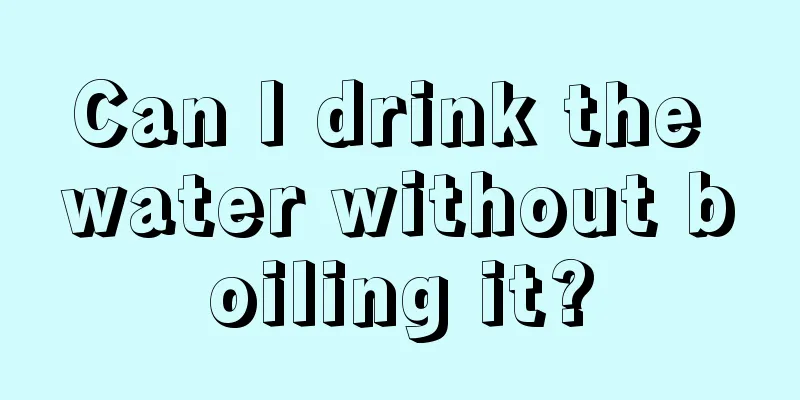Can I drink the water without boiling it?

|
Many people believe that if you drink raw water, there are many bacteria and parasites in the water that will be harmful to the human body. They like to boil the water before drinking it, because when the boiled water reaches 100 degrees, many bacteria and parasites are killed. If you don’t drink the water, the harm to the human body will be relatively small. However, sometimes the water may not boil due to air pressure or other factors. So can you drink the water before it is boiled? Generally, water can be drunk when it reaches 85 degrees, because most bacteria will die at this temperature. I'm an electrical appliance repairman. The temperature controller for the automatic water heating in the water dispenser is 85 degrees. When the heating wire heats the water to 85 degrees, it will enter a protection mode and will not continue heating. It is best if it can be heated to above 95 degrees. Some bacterial spores are more tenacious, so it will be safer to boil them a little. Also, water cannot reach 100 degrees under normal boiling conditions. It can only reach this level under high pressure. It takes three minutes to boil water. People in cities basically drink tap water, which is treated by water plants from ordinary rivers and lakes. Chlorination is required to remove microorganisms and other impurities in the water. However, chlorine continues to react chemically with residual organic matter in the water to produce toxic and carcinogenic compounds such as halogenated hydrocarbons and chloroform. Experiments have shown that there is a close relationship between the content of halogenated hydrocarbons and chloroform and the water temperature change ratio and boiling time. When the water temperature reaches 90 degrees Celsius, the content of halogenated hydrocarbons and chloroform will rise, at least more than twice the original level. When the water temperature reaches 100 degrees Celsius, it will drop, and if it continues to boil, the content of halogenated hydrocarbons and chloroform will continue to drop! Of course, the longer the water boils, the better! Studies have shown that the content of halogenated hydrocarbons and chloroform is closely related to changes in water temperature and the duration of boiling. When the water temperature reached 90°C, the content of halogenated hydrocarbons increased from 53 micrograms per liter to 191 micrograms, and the content of chloroform increased from 43.8 micrograms per liter to 177 micrograms, both exceeding the national standard by twice. When the water temperature rises to 100°C, the contents of halogenated hydrocarbons and chloroform drop to 110 micrograms and 99 micrograms respectively, which still exceed the national standard. If boiling continues for 3 minutes, the halogenated hydrocarbons and chloroform contents drop to 9.2 micrograms and 8.3 micrograms respectively, and then it becomes safe drinking water. Of course, boiling water for a longer time is not necessarily better, because the longer it is boiled, the more the non-volatile harmful substances and nitrites in the water will be concentrated due to the evaporation of the water, and the content will increase relatively. Drinking such water will also be harmful to the body. |
<<: Can the Dripping Guanyin be placed in the bedroom?
>>: Do you get pimples on your face after putting on makeup?
Recommend
Is it ok to take Chinese medicine and get anti-inflammatory injections?
In modern life, when we encounter diseases, we of...
Can pregnant women eat swordfish?
Swordfish, also known as swordfish, is called swo...
How to remove freckles? Correct secret recipe for removing freckles
Everyone loves beauty. With the improvement of pe...
Can I fan myself during confinement?
For many mothers who give birth in the summer, co...
What should patients with laryngeal cancer do if they keep coughing?
Patients with laryngeal cancer may also experienc...
Normal amniotic fluid color
I believe everyone knows that amniotic fluid is a...
What are the ways to care for dry and dandruffy leg skin in winter
Dry and flaky skin on the legs is a common sympto...
Medicinal value of Hericium truncatum
When it comes to Hericium erinaceus, many people ...
How should lung cancer patients eat? Introduction to the diet method for lung cancer patients
Lung cancer is one of the malignant tumors with t...
How long does it take for the swelling to go down after renal hamartoma surgery
How long it takes for the swelling to go down aft...
What's wrong with my head aching?
Many people may wonder what is causing the dull h...
The harm of laser treatment of age spots
Does the laser method of removing age spots reall...
Black hair health tea
Nowadays, many people have white hair at a young ...
How long can you live with gallbladder cancer
With the progress of the times, people's livi...
What tests can detect early liver cancer?
Generally, the following tests are required: labo...









